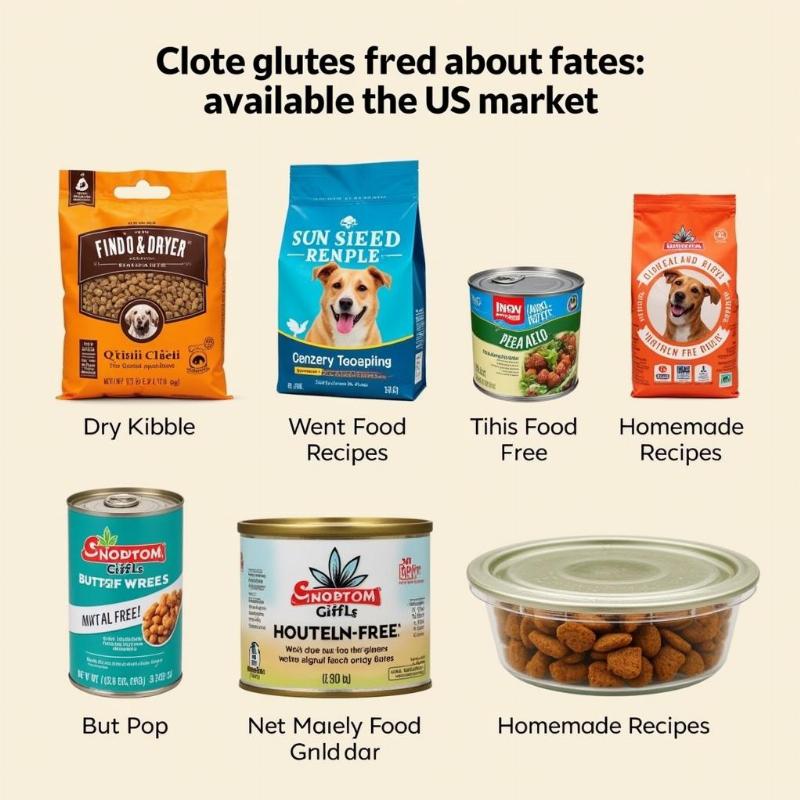Gluten-free diets have become increasingly popular for humans, but what about our canine companions? Do dogs need gluten-free food? While not as common as in humans, gluten sensitivities can occur in dogs. Understanding the role of gluten in your dog’s diet, recognizing the signs of intolerance, and knowing how to choose the right gluten-free food are crucial for ensuring your furry friend’s health and well-being. This article delves into the world of gluten-free food for dogs, offering guidance for concerned pet owners across the United States.
Understanding Gluten and Its Effects on Dogs
Gluten is a protein found in wheat, rye, and barley. For most dogs, gluten is not a problem. They can digest it without any issues. However, some dogs may have a sensitivity or intolerance to gluten, which can manifest in a variety of ways. This intolerance is often linked to a condition called gluten-sensitive enteropathy, where the dog’s immune system reacts negatively to gluten, leading to inflammation in the small intestine.
Recognizing the Signs of Gluten Intolerance in Your Dog
Is your dog exhibiting unusual symptoms after eating food containing gluten? It’s important to recognize the potential signs of gluten intolerance, which can include: chronic diarrhea, vomiting, weight loss, itchy skin, and a dull coat. If your dog is displaying any of these symptoms, consult with a veterinarian. They can perform tests to determine if a gluten-free diet is necessary.
Choosing the Right Gluten-Free Food for Your Dog
If your veterinarian recommends a gluten-free diet for your dog, it’s essential to choose the right food. Look for dog food specifically labeled “gluten-free.” Be sure to check the ingredient list to ensure it doesn’t contain any hidden sources of gluten, such as wheat flour or malt flavoring. Prioritize brands that meet the Association of American Feed Control Officials (AAFCO) standards, ensuring the food provides complete and balanced nutrition for your dog’s life stage.
Benefits of a Gluten-Free Diet for Dogs with Intolerance
Switching to gluten-free food can drastically improve the health and well-being of dogs with gluten intolerance. By eliminating the source of inflammation, you can expect to see improvements in digestion, skin and coat health, and overall energy levels.
 Gluten-Free Dog Food Options
Gluten-Free Dog Food Options
Transitioning Your Dog to a Gluten-Free Diet
When transitioning your dog to a gluten-free diet, do it gradually to avoid digestive upset. Start by mixing a small amount of the new food with their current food, slowly increasing the proportion of gluten-free food over several days until they are fully transitioned. Monitor your dog closely for any changes in their stool or behavior during the transition.
Are There Any Risks Associated with Gluten-Free Dog Food?
“While gluten-free diets are essential for some dogs,” says Dr. Emily Carter, DVM, a veterinary nutritionist based in Austin, Texas, “it’s crucial to ensure the diet remains balanced. Simply removing gluten doesn’t guarantee optimal nutrition.” She emphasizes the importance of consulting with a vet to avoid potential nutrient deficiencies.
Conclusion
Gluten-free food for dogs can be a lifeline for those suffering from gluten intolerance. By understanding the signs, choosing the right food, and transitioning carefully, you can help your dog live a healthier, happier life. Remember to always consult with your veterinarian before making any dietary changes for your furry friend.
FAQ
- How do I know if my dog needs gluten-free food? Consult your veterinarian if you suspect gluten intolerance. They can perform the necessary tests.
- What are the common ingredients in gluten-free dog food? Common ingredients include rice, sweet potatoes, chicken, fish, and various fruits and vegetables.
- Is gluten-free dog food more expensive? Gluten-free dog food can sometimes be more expensive due to specialized ingredients.
- Can I make gluten-free dog food at home? Yes, but consult a veterinary nutritionist to ensure the diet is balanced.
- What if my dog accidentally eats something with gluten? Monitor your dog for any adverse reactions and contact your vet if necessary.
- Are there any dog breeds more prone to gluten intolerance? Irish Setters are particularly known for gluten sensitivity.
- Can gluten intolerance develop later in a dog’s life? Yes, it can develop at any age.
Related Articles
Beautdogs.us is your premier source for all things dog-related in the United States. We offer expert advice on dog breeds, care, and product recommendations for a happy and healthy canine companion. Whether you’re a new dog owner or a seasoned expert, Beautdogs.us provides reliable information and resources to help you navigate the world of dog ownership. Contact us today for personalized guidance: Email: [email protected], Phone: +1 501-555-7529.